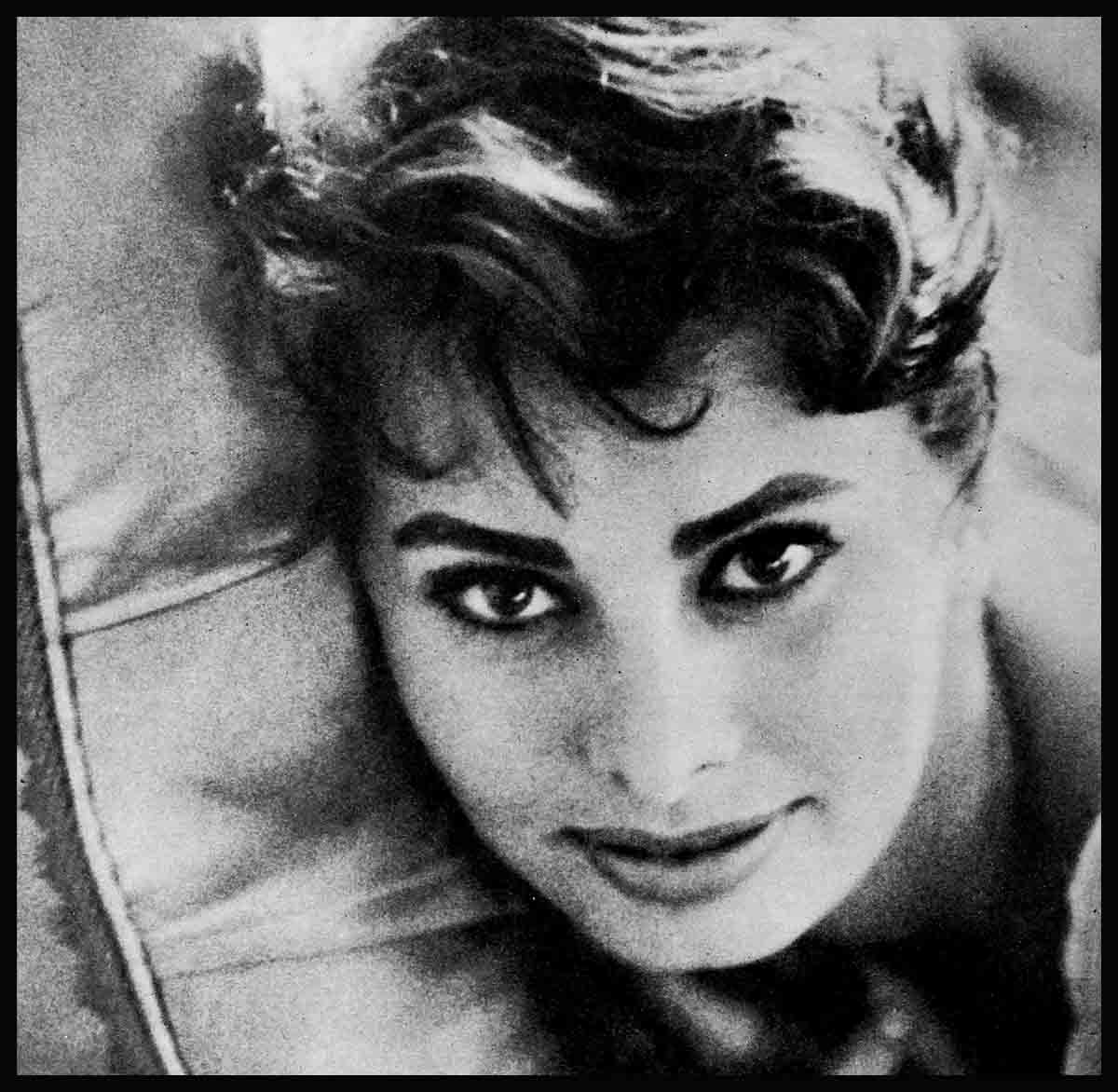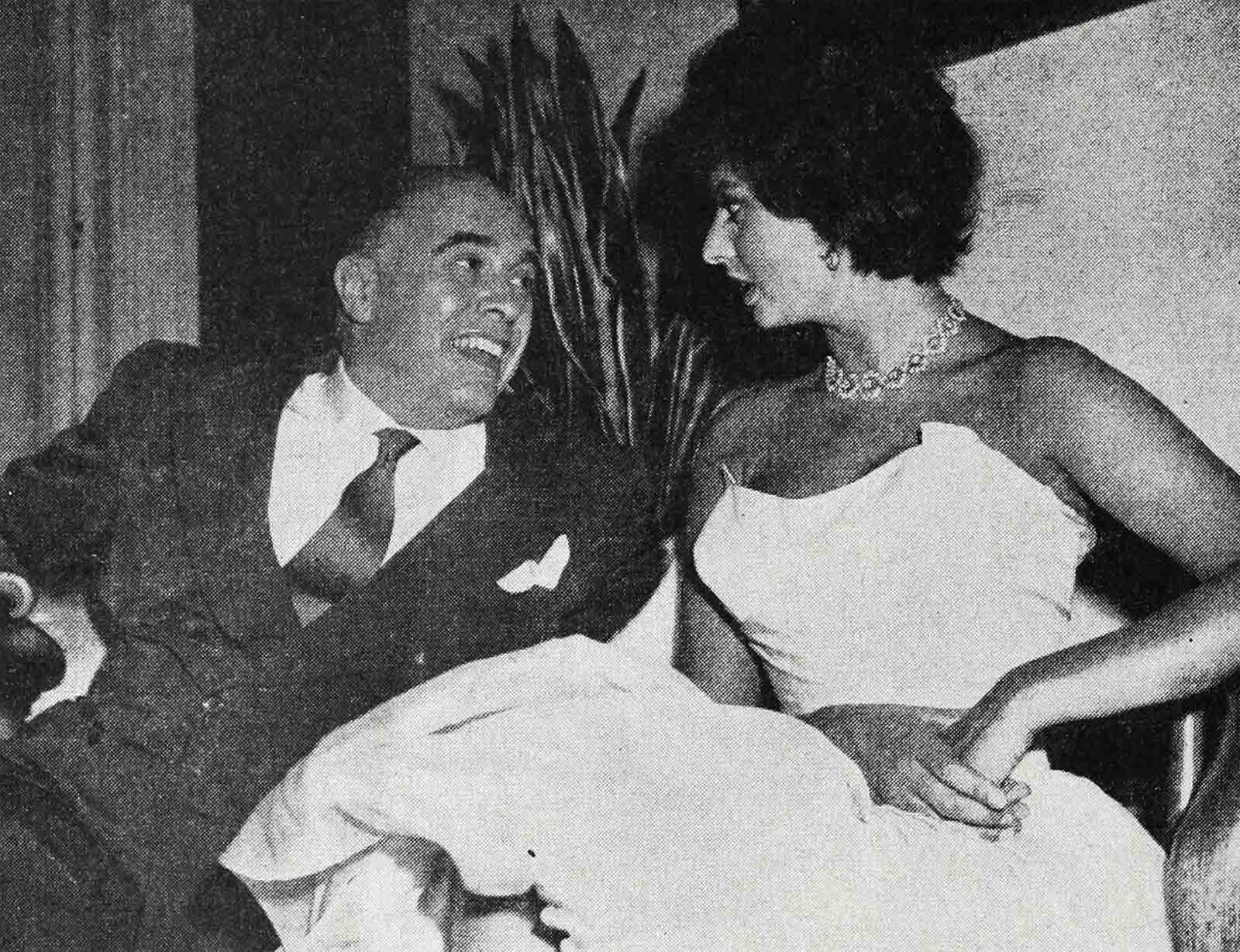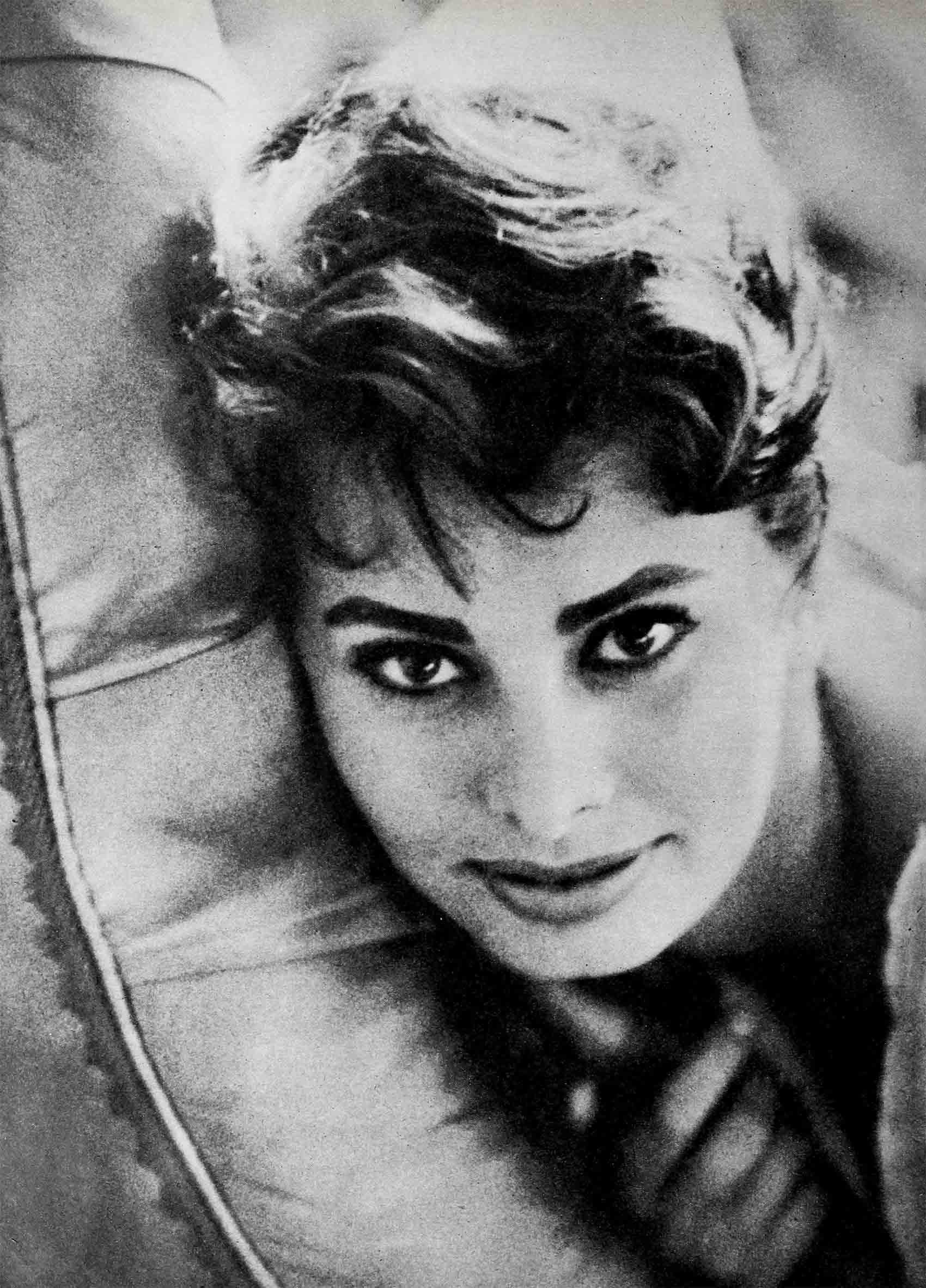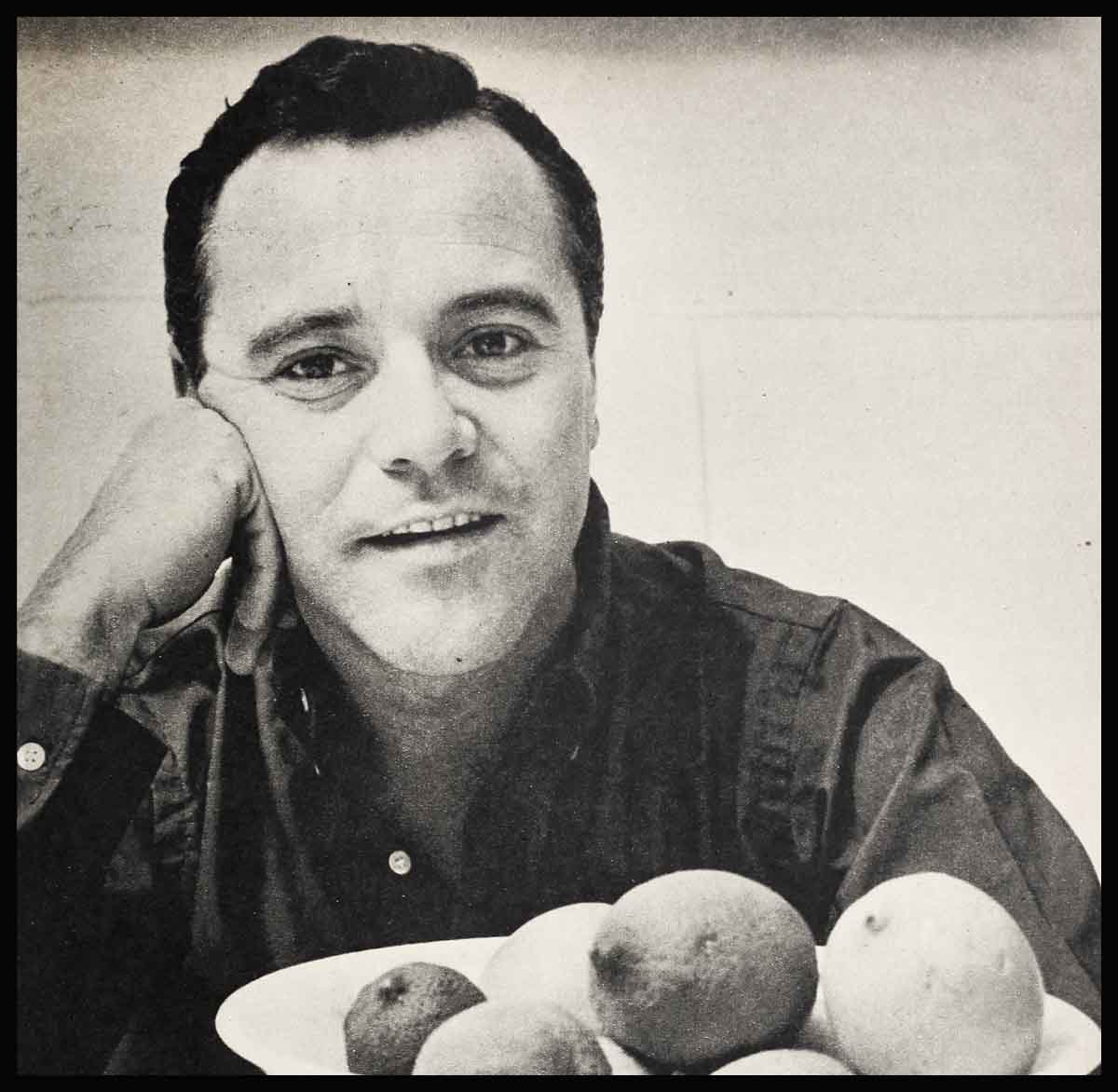
Sophia Loren: “I Have Loved Only Once”
In the Roman street outside the offices of Ponti Film Productions, the sun was warm. But the seventeen-year-old girl who stood and stared at the lettering over the door shivered. She was nervous. She was scared.
She walked slowly into the building, her feet feeling like lumps of lead, her heart pounding. “Where is the office of Mr. Carlo Ponti?” she managed to blurt to the neat, attractive secretary. “I have an appointment . . . I am Sofia Scicolone,” she added, almost apologetically. That Neapolitan accent of hers—she knew it was bad. It must sound awful to this sleek, polished Roman girl.
“Oh, yes,” the girl said, smiling, and pointing down the hall. “Right over there. Mr. Ponti is expecting you.”
Outside his door, she stopped again, fussing at the rich mass of chestnut hair that hung about her shoulders, tugging and smoothing the dress that she and Mama and Maria had worked on for hours that morning. Then she bit her lip, and squared her shoulders. “Don’t be a timid goose,” she told herself angrily. On the other side of that door lay the fulfillment of all their dreams. No more homemade clothes. No more scraping to make ends meet. No more posing for the fumetti, those cheap romance magazines that looked like comic books—only they used scantily-clad, sexy-looking models instead of drawings. She’d had to do it, because they needed the money. Some of them she hadn’t even dared to tell Mama about. Then the police confiscated one issue that had her pictures in it. “Never again,” she promised herself bitterly. “Never again.”
She walked into the office proudly, defiantly. The man sitting behind the big desk, engrossed in his work, didn’t look very frightening. He was a little man, balding, a bit paunchy. About forty, she thought. And when he looked up at her, he smiled and his eyes were kind.
“You wanted to see me?” she asked timidly, the old shyness flooding back.
“Yes. So you’re Sofia Scicolone.” He eyed her curiously, but she was relieved when she saw it wasn’t the way men usually looked at her—first startled, then greedy with desire. The first time it happened, back home in Naples when she was fifteen and a bunch of sailors whistled at her when she walked down the Via Roma, it was the biggest thrill she’d ever had. Then, she knew she wasn’t what they always called her—stechetto, “little stick.” She wasn’t ugly. She wouldn’t be an old maid, like everybody thought. But even now, the memory made her cringe.
The girl had a magnificent body, Carlo Ponti thought. But he wasn’t impressed by that. As a movie producer, he’d seen many beautiful girls with fine figures. In Italian pictures, they were a standard commodity. But this girl was different. Her nose was not too good—a little long, he noted automatically. And the chin line—but that was nothing that could not easily be overcome. The huge, wide amber-colored eyes, and the wide, sensuous mouth more than made up for the shortcomings. And there was something else—something he couldn’t define.
“You carry yourself very well,” he said—partly out of genuine admiration for her fine, ramrod posture, partly to put her at her ease.
Somehow, all the defensive suspicion she usually felt with men melted before his gentle gaze. She settled comfortably in the chair opposite him, and giggled. “You’ll have to thank my mother for that,” she confided. “I’m so tall, and when I was a girl, I tried to stoop all the time to hide it. But my mother made me go around with a stick across my back. That straightened me out pretty quick!”
And, before she knew it, the whole story came tumbling out. How her mother, Romilda Villani, had never been married to her father. (“She’s honest,” thought Carlo Ponti. “I like that.”) How he had deserted them before Maria was born, and her mother struggled to support them by giving piano lessons.
“My mother could have become a great actress,” said Sofia proudly. “She won a big contest to find a girl like Greta Garbo. She had a chance to go to Hollywood, but her mother wouldn’t let her.”

Her face clouded, as she told about the bombings, when the Nazis came. “That’s how I got this,” she said, pointing to a small scar on her chin. She had run, terrified, into an air raid shelter, and had fallen all the way down a flight of steps.
Seeing the pity in his face, she stiffened. “We were not poor,” she said hotly. “Everybody had nothing to eat. Everybody had poor clothes. Everybody stood in the breadlines.”
Now he knew what it was about her. This was not just another girl with a pretty face and a stunning figure. This was a woman of strength, and fire, and character. Young and crude and untrained as she was, she had the stuff of which great stars are made.
Carlo Ponti felt a thrilling excitement. He knew it well. It was the same excitement that had led him, at the age of twenty-seven, to turn his back on the easy life of a very wealthy son of a distinguished Italian family, and a promising law career, to become a film producer. He had felt it when he discovered Alida Valli, and had been hailed as the Italian Orson Welles as a result of their first film. To make good pictures, to develop great talent—this was his passion. His family did not understand. Sometimes, he wondered if his wife, Giuliana, brought up strictly as the daughter of an Italian general, far from the heady world of show business, could understand . . .
“We’ll have to change your name,” he said to Sofia.
“You mean . . .” she gasped, “you want me in a picture?”
“That’s right,” he smiled. “Your test was successful. I have a part for you in a film I’m casting now, ‘Tratta delle Bianche’.”
“Oooh,” she breathed, “thank you.”
His face grew grave. “I have a feeling that you can go very far. But it will not be what you may think. It will be very hard work. There will be disappointments, criticism. Can you take that?”
“I am used to working,” she said. “I have done nothing but work since I was fifteen.”
“Good. Then it’s settled,” Carlo Ponti said. And Sophia rushed home, to the little apartment to share the good news with Mama and Maria.
They were all so happy. But she soon found out what Carlo meant, about the hard work. In two years, she made thirteen pictures. “You must be seen as much as possible,” Carlo Ponti said. “The public must know who Sophia Loren is.” Sophia Loren—the name was Mr. Ponti’s idea. She liked it—especially when she saw it up on the billboards, and on the marquees. Sophia Loren—what a thrill!
But working before the camera—that wasn’t the half of it. “You must get rid of that Neapolitan dialect,” Mr. Ponti had snapped at her, right off. She just stared at him, bewildered. Dialects and accents weren’t a problem to Italian film-makers, she knew. They couldn’t waste time and money on speech lessons, so they simply dubbed in the voices. But dutifully, she went off to the tutor Mr. Ponti selected, and practiced Italian as it was spoken in the high Italian social circles, until her throat ached.

The acting lessons—those she loved. But sometimes, she grew so discouraged. There was so much to learn, and so little time.
And Mr. Ponti, so kind and benign, turned into a relentless taskmaster. He told her how to sit, how to eat, what to wear, what to say, what not to say. Some day, he knew, she would thank him for it. But now, he thought wryly, “I’m beginning to feel like Svengali.”
Sometimes it got to be too much, and she would burst into a display of fine Neapolitan temperamental fireworks, always ending by running into a room where she could fume by herself, slamming the door behind her.
“I’m sorry,” she said shyly and meekly when she came out. “It’s just that I get mad at myself. I never get mad at anything else.”
That was true, Ponti thought. And his heart softened in sympathy for the girl who had been through so much, and was taking so much now, without a whimper, working day after day from sunup until far into the night.
Carlo Ponti was having troubles of his own. Shortly after he had signed Sophia, he and his wife had separated, and Sophia was one of the reasons. Not because of any romantic interest—that was the furthest thing from Giuliana’s mind. How could the polished Carlo ever become interested in a crude girl from Naples? But Giuliana knew that girl Carlo was backing was becoming a real threat to her dear friend, Gina Lollobrigida. Out of loyalty to her friend, she could do nothing else but oppose Sophia.
What could he do? Abandon Sophia? In Italy, she was a well-established star. She could get plenty of work. But he knew she wasn’t ready—not for the future that could be hers. No, he couldn’t do that. It just wouldn’t be right. And when Sophia listened to him, her eyes brimming with faith and trust, he knew that he could not forsake that trust.
He did not see something else in Sophia’s eyes . . . something of which she dared not speak. Love. “Or is it?” she wondered, as she tossed fitfully in her bed before falling into the deep sleep of exhaustion. He was the only man she had ever known well, outside her family. She had no time for dates. Mama Romilda, bent on seeing her own dreams fulfilled for her daughter, had always shooed the wolves away in no uncertain terms, even that nice young man who came to the house with a proper proposal of marriage. It could be that her feelings for Carlo were merely gratitude. “But I do know,” she thought dreamily, her heart full, “that he is the best, the kindest man in the world . . .”
All her dreams had come true, now . . . Almost. She and Mama and Maria had a big apartment in Rome, and a house in Naples huge enough to welcome all thirty-two of the big family clan. She had a big Cadillac, and a chauffeur. She had more furs and jewels, more beautiful gowns than she could ever wear. Everything. Except what she wanted most. A husband. And babies.
All her life, she had dreamed of being a star in Hollywood. She went to see an American movie every week, and she idolized the stars, especially her favorite since childhood, Barbara Stanwyck. When Carlo told her that she was to make an American picture, “The Pride and the Passion,” with Cary Grant and Frank Sinatra, she was thrilled, of course. But strangely sad, too. And as soon as she pulled out for Madrid, she knew why. She missed Carlo terribly.
As always, he had prepared her well. For months, he had her study English, and had her carry a little black book, in which she dutifully recorded all new words and phrases. But although Carlo had sent one of his henchmen with her, she felt strange—lonely, and frightened.
Mr. Sinatra and Mr. Grant were wonderful. They joked about her little black book, and Mr. Sinatra taught her a lot of funny words—“jive talk,” he called it. One day, she announced to him in a sudden burst of courage, “We Neapolitans are hot and expensive!” He usually came back with a joke, but this time he looked stunned. Then he laughed hard, and said, “Oh, you mean warm and expansive!”
And Mr. Grant was a real friend. She asked him about Hollywood. Would she like it? Would they like her? Was it a cruel place, like they said? He told her, “Sophia, you will have to become adjusted to it. It took me about six years! But that’s because I’m English. I don’t think it will take you more than six months, and after that, you’ll love it, too.”
But the best times were the weekends, when. Carlo would fly down to see her, carrying a suitcase filled with spaghetti! Then they would have a feast, and she would tell him all the exciting things that happened.
Picture offers were pouring in now—so many it made her head swim. There was “Boy on a Dolphin,” to be made in Greece, “Legend of the Lost,” to be made in Africa, and—oh, joy of joys—“Desire Under the Elms,” to be made for Paramount in Hollywood!
Back in Rome, she prepared to storm Hollywood like a general preparing for an invasion. Straight to Rome’s famous couturier, Schubert, she went, to order enough gowns, dresses, suits and coats to last several years. Weeks were spent at fittings in the salon. Then everything was carefully catalogued on paste-up boards by Jean Shaw, the American secretary who speaks perfect Italian, to Sophia’s delight. After that, it was packed into twelve beige-colored ocean trunks, with “Sophia Loren, Hollywood” printed in small type—very dignified and simple.
At the boat, Carlo gaped in amazement. Then he grinned. Sophia would always be the child of Naples, free and unfettered, doing exactly as she pleased regardless of what others thought. If she wanted twelve trunkfuls of clothes, she would have them. He knew, too, that those trunks were a defense—they gave her a feeling of security in facing the new world in Hollywood.
A warm, protective feeling came over him. How much she meant to him! How much she delighted him with her uninhibited joy in life, so different from his own staid upbringing. He knew, now, that he was in love with her. He realized how glad he was that business matters were taking him to Hollywood, too.
Hollywood was something beyond her wildest dreams. How did they say it? Roll the red carpet. That was what they did for her. They had big parties, and she met everybody—all the big stars, including her idol, Barbara Stanwyck.
Carlo went with her and sister Maria when they picked a house. Sophia looked at the first one they saw, and said, “I’ll take it.” Carlo suggested looking further. A big, red brick mansion in Brentwood, the rent was $2000 a month. But when he looked at the grounds, he didn’t press the matter. The rolling lawn, with its trees and flowers, he knew reminded Sophia of home.
In no time, Maria was swept up in a whirl of dates with handsome escorts. Not Sophia. At night, she stayed in her bedroom, watching TV. The silence bothered her, so she had it turned on all the time. She needed rest, it was true, for she was off to the studio every morning at 5:30. But the explanation wasn’t enough. She had always had amazing vitality and stamina, and could have been none the worse for a little social life.
To reporters who queried her about the men in her life, she answered cryptically, “I have been in love only once. I still am. I can say nothing more.”
No, she could say nothing more. Could her dream of happiness with Carlo ever come true? For sadly, Carlo’s divorce would be recognized in every country but her own—Italy.
Their hopes rose when they went to Switzerland after the picture was finished. There, she had decided to make her home, as a practical move, for tax purposes. There, Carlo could get a divorce. And jubilantly, Sophia proclaimed, “I no longer hide the feelings that bind me to Carlo. I am happy and in love.”
Then they learned that ten years’ residence would be required. A Mexican divorce, for Carlo, and a proxy marriage, were the only solution. Since Carlo had reached full agreement with Guiliana, the divorce was speedily secured. And, back in Hollywood, at work on “Houseboat” Sophia received the news that she and Carlo were married.
A strange wedding—no gown, no ceremony, not even a bridegroom present. And Sophia did not react as a happy bride. She seemed like a girl who had got what she wanted, but felt apprehensive about the whole thing.
UP correspondent Henry Gris, an old friend of former days, told her that such a quiet wedding was not the usual Hollywood style. Her eyes flashed as she replied, “I don’t need Hollywood’s permission to get married. I did not consider it necessary to tell anybody. My life is my own.”
When he told her that press agents sometimes even accompany stars on their honeymoons, she threw back her head and laughed. “Accompany on a honeymoon? What will Hollywood think of next!”
And to Henry Gris, in what he declared would be his only interview on the marriage, Carlo Ponti said, “We didn’t want a ballyhooed movie marriage, or any other ballyhoo to involve our private lives.
“I hope they won’t make me into a Mr. Sophia Loren,” he smiled. “After all, I’m a film producer of some note and there are three Ponti pictures going in Italy now.”
Of their future plans, he said, “Sophia will be working in ‘The Key’ with William Holden until the end of the year. Then well go to our home in Burgenstock, Switzerland, where she’ll rest a while. Then we’ll come back to Hollywood for her next picture.” Plans are now being made for two future Loren films, produced by Ponti with his partner, Gilosi, to be released by Paramount.
He and Sophia will buy a home in Hollywood. But they cannot have a home in Rome.
“I’m sorry to say,” said Carlo, “that our Juarez marriage is recognized everywhere but in Italy. However, I hope that eventually I’ll be able to obtain an annulment of my previous marriage. My first wife and I are working on it and are in full accord. We are good friends. As often as possible, I see my two children, a boy and a girl aged eight and nine. We will have to leave the problem of my marriage in Italy to be worked out without pressure, with dignity.”
But Carlo’s hopes of working out the situation quietly have met with stern disapproval in Rome. The first blast came from the Vatican’s L’Osservatore della Domenica, which said such a marriage exposed the participants to excommunication although it did not name names. The second came from the official publication of Italian Men’s Catholic Action, urging all Roman Catholics to shun Sophia’s films.
Although Sophia stoutly declared, “I hope to have seven children,” there is no doubt that these attacks have hurt her deeply.
In Rome, Mama Romilda flew to her daughter’s defense. She and Maria had been in on the secret of the proxy wedding, and it had their complete approval. “This is Sophia’s dream come true,” her mother declared. “I know that she has loved Carlo ever since she met him.”
Then she added hotly, “If Ingrid Bergman and Roberto Rossellini could do it, I don’t see why Sophia and Carlo can’t. After all, they were married to other people, and their marriage is valid in Italy.”
She might have avoided the storm. She might have married any other man her heart desired—she could not help but know that. Her contract with Ponti had only a year to run, and, from a business standpoint, the handsome profits her films have earned have more than fulfilled her obligation to him.
But Sophia will never see it that way. Others may see Carlo as a balding, middle-aged film producer. But to her, he is “the only man I fully trust.” In her present world, filled with false flattery and the selfish aims of those who seek to use her for their own gain, she needs that trust. And she needs the quiet life they share—the hours spent away from the glamour whirl, watching TV or playing canasta, cozily sharing a plate of warmed-up spaghetti. Still the simple girl who washes her hair over the sink every evening, she knows that the sophisticated Carlo has much to teach her, too.
But most of all, she feels that the debt she owes him, she can never repay.
From a heart sorely torn, but filled with love, Sophia can only say, “Everything that I am I owe to Carlo. For me, he is the only man in the world.”
THE END
—BY JEAN LEWIS
It is a quote. PHOTOPLAY MAGAZINE JANUARY 1958





No Comments